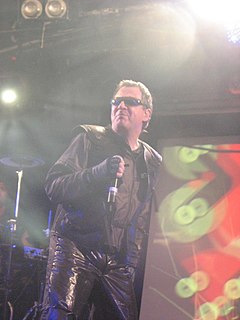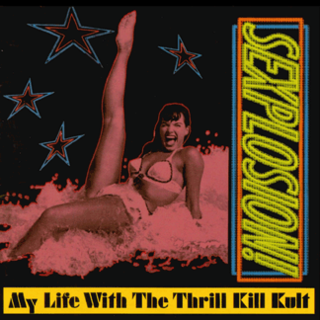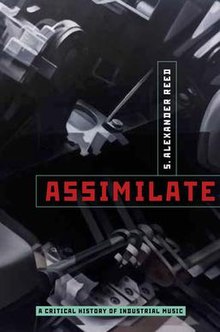Musicology is the scholarly analysis and research-based study of music. Musicology departments traditionally belong to the humanities, although some music research is scientific in focus. Some geographers and anthropologists have an interest in musicology so the social sciences also have an academic interest. A scholar who participates in musical research is a musicologist.
Music history, sometimes called historical musicology, is a highly diverse subfield of the broader discipline of musicology that studies music from a historical point of view. In theory, "music history" could refer to the study of the history of any type or genre of music. In practice, these research topics are often categorized as part of ethnomusicology or cultural studies, whether or not they are ethnographically based. The terms "music history" and "historical musicology" usually refer to the history of the notated music of Western elites, sometimes called "art music".

"A Drug Against War" is a song by industrial rock band KMFDM, taken from their 1993 album Angst. It was released as a single prior to the album. A music video, featuring animated depictions of the band's previous album covers and singles, was made for the single, and was subsequently shown on the MTV cartoon Beavis and Butt-head on July 11, 1994. It was re-released as a 7" in 2009. The song was featured in the video game Brütal Legend and, on December 16, 2010, it was made available as a downloadable song for the game Rock Band. In late 2011, the band released a new version of the song called "A Drug Against Wall Street", with lyrics in support of the Occupy Wall Street movement, and made it available for free download from their site.

Zoviet France are a music group from Newcastle upon Tyne in north east England. While often dissonant and made of industrial textures, their music also falls into the ambient music category. Formed in 1980, and remaining largely anonymous, the group has had a number of members; presently it consists of co-founder Ben Ponton and Mark Warren. Former members included Neil Ramshaw, Peter Jensen, Robin Storey, Lisa Hale, Paolo Di Paolo, Mark Spybey and Andy Eardley. In 2005 Storey, Spybey and Eardley formed a new group, Reformed Faction.

Metropolis Records is a record label founded in Philadelphia, Pennsylvania in 1993 by Dave Heckman. The label's all-electronic format closely tracked with European contemporaries, such as Off Beat, and; since 1995, has been instrumental in promoting and distributing underground electronic music in America.

Jean-Luc De Meyer is a vocalist and lyricist who is best known as the lead vocalist of the Belgian EBM group Front 242.
Acid Horse was a one-off collaborative side project between two industrial music pioneers, Ministry and Cabaret Voltaire. Only one single, "No Name, No Slogan", was released in 1989 on Wax Trax! Records. The band name is a combination of the slang terms for LSD (acid) and heroin (horse), as well as a play on the title of the then-popular acid house movement.

The American Musicological Society (AMS) is a musicological organization which researches, promotes and produces publications on music. Founded in 1934, the AMS was begun by leading American musicologists of the time, and was crucial in legitimizing musicology as a scholarly discipline.
Informatik formerly known as Informätik is an electro-industrial/futurepop duo from Boston that was formed in 1993 and is represented by Metropolis Records in the US and Dependent Records in Europe. The band were repeat contributors to the "Mind/Body" compilation series organized by participants of the rec.music.industrial Usenet group in the mid-nineties. Both members are vegans.
Liaisons Dangereuses was founded by Beate Bartel and Chrislo Haas together with vocalist Krishna Goineau in Düsseldorf, West Germany in 1981. Before the Liaisons Dangereuses trio, Chrislo Haas and Beate Bartel were in duo named CHBB. They released an eponymous album earlier the same year as the creation of Liaisons Dangereuses in 1981. A sort of premise before Krishna Goineau joined. As a part of the Neue Deutsche Welle scene in Germany they pioneered EBM.

Ancienne Belgique is a concert hall for contemporary music in Brussels, Belgium. Located in the historic heart of Brussels, it is one of the leading concert venues in Belgium, hosting a wide variety of international and local acts.

Bourbonese Qualk are an experimental music group which existed from 1980 to 2003. The group were participants in the early 80s industrial & experimental music tape scene. Writing for CMJ, Martin Aston characterized Bourbonese Qualk as "post-punk, avant funk" along the lines of 23 Skidoo, A Certain Ratio, 400 Blows and early Cabaret Voltaire.

Richard Jonckheere, better known by his stage names Richard23 and Richard JK, is a Belgian musician. He has been a member of Front 242 and was a founding member of Revolting Cocks. He released the EP Free Tyson Free! with Jean-Pierre Everaerts and Marc Desmare, using the moniker Holy Gang, and two 12-inch singles in 1999/2000 as LaTchak.
P16.D4 was a German electronic noise music collective, active primarily from 1980 to 1988. P16.D4 embraced tape cut-ups, musique concrète, endless recycling and transformation of previously published material, and many long-distance collaborations with like-minded artists such as DDAA, Vortex Campaign, Nurse With Wound, and Merzbow. Their active participation in the international industrial tape scene yielded collaborative output such as their release Distruct, where bands such as Nurse with Wound, Nocturnal Emissions, Die Tödliche Doris, and The Haters provided the source material. The longest-term collaboration was with the installation and conceptual artist Achim Wollscheid, who used P16.D4 sounds as the basis for LPs he recorded under the name SBOTHI. Ralf Wehowsky, the only constant member of the group, later released solo material under the alias RLW.
Steven R. Gilmore is a Canadian artist and graphic designer most known for his work on album cover design, particularly his role as in-house artist for Nettwerk Records for much of the 1980s and 1990s. He has designed record album sleeves for bands such as Skinny Puppy, Nickelback, A Perfect Circle, BT, Machines of Loving Grace, and Two Steps from Hell.
Alexander Rehding is Fanny Peabody Professor of Music at Harvard University. Rehding is a music theorist and musicologist with a focus on intellectual history and media theory, known for innovative interdisciplinary work. His publications explore music in a wide range of contexts from Ancient Greek music to the Eurovision Song Contest—and even in outer space. His research has contributed to Riemannian theory, the history of music theory, sound studies, and media archaeology, reaching into the digital humanities and ecomusicology.
Walter Everett is a music theorist specializing in popular music who teaches at the University of Michigan.

Sexplosion! is the third studio album by industrial disco band My Life with the Thrill Kill Kult. It was originally released in 1991 on Wax Trax! Records. Described by lead vocalist Groovie Mann as their "sexy" album, Sexplosion! is one of the band's biggest commercial and critical successes.
Cold Meat Industry was a Swedish independent record label established in 1987 by Roger Karmanik, which specialized in niche music genres such as dark ambient, death industrial, and neoclassical dark wave.









